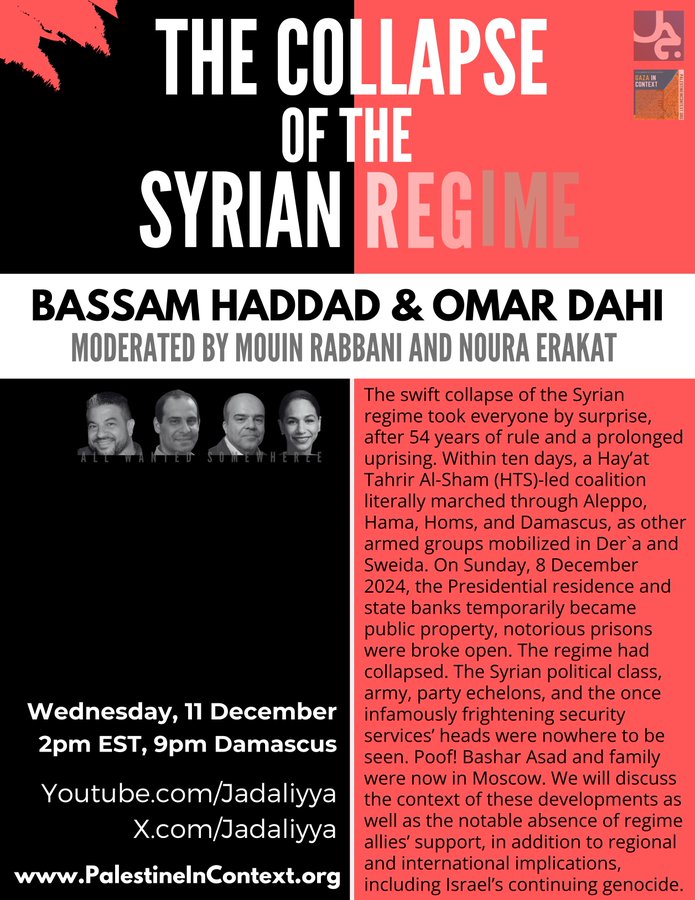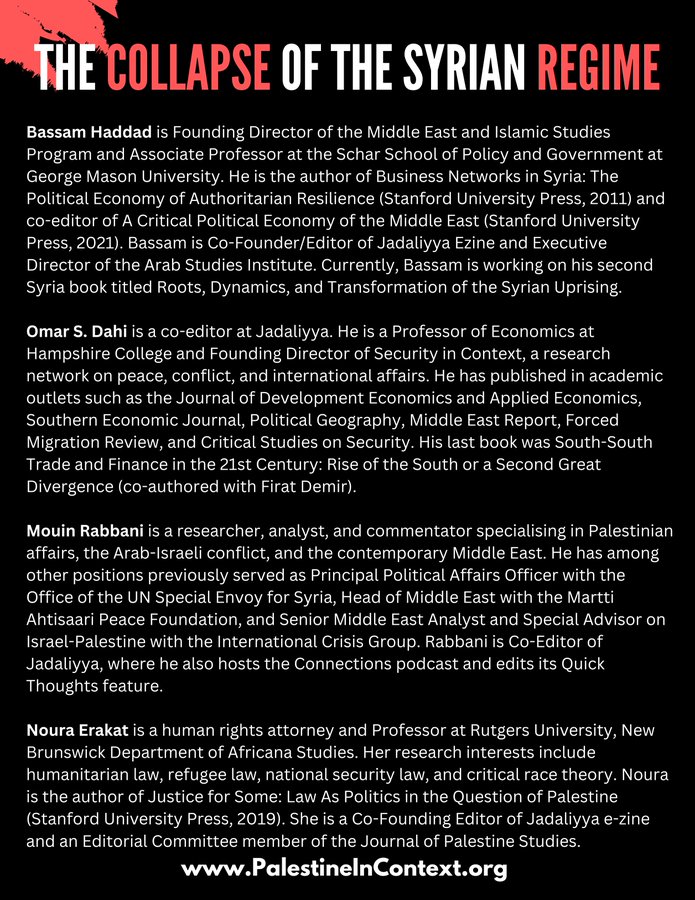The Collapse of the Syrian Regime
Featuring:
Bassam Haddad & Omar Dahi
Moderated by:
Mouin Rabbani & Noura Erakat
Wednesday 11 December 2024
2:00 PM EST | 9:00 PM Damascus
WATCH LIVE YOUTUBE.COM/@JADALIYYA/STREAMS
The swift collapse of the Syrian regime took everyone by surprise, after 54 years of rule and a prolongeduprising. Within ten days, a Hay’at Tahrir Al-Sham (HTS)-led coalition literally marched through Aleppo, Hama, Homs, and Damascus, as other armed groups mobilized in Der`a and Sweida. On Sunday, 8 December 2024, the Presidential residence and state banks temporarily became public property, notorious prisons were broke open. The regime had collapsed. The Syrian political class, army, party echelons, and the once infamously frightening security services’ heads were nowhere to be seen. Poof! Bashar Asad and family were now in Moscow. We will discuss the context of these developments as well as the notable absence of regime allies’ support, in addition to regional and international implications, including Israel’s continuing genocide.


Featuring
Bassam Haddad (Host) is Founding Director of the Middle East and Islamic Studies Program and Associate Professor at the Schar School of Policy and Government at George Mason University. He is the author of Business Networks in Syria: The Political Economy of Authoritarian Resilience (Stanford University Press, 2011) and co-editor of A Critical Political Economy of the Middle East (Stanford University Press, 2021). Bassam is Co-Founder/Editor of Jadaliyya Ezine and Executive Director of the Arab Studies Institute. He serves as Founding Editor of the Arab Studies Journal and the Knowledge Production Project. He is co-producer/director of the award-winning documentary film, About Baghdad, and director of the acclaimed series Arabs and Terrorism. Bassam is Executive Producer of Status Podcast Channel and Director of the Middle East Studies Pedagogy Initiative (MESPI). He received MESA's Jere L. Bacharach Service Award in 2017 for his service to the profession. Currently, Bassam is working on his second Syria book titled Understanding The Syrian Tragedy: Regime, Opposition, Outsiders (forthcoming, Stanford University Press).
Omar S. Dahi (Host) is a co-editor at Jadaliyya. He is a Professor of Economics at Hampshire College and Founding Director of Security in Context, a research network on peace, conflict, and international affairs. He has published in academic outlets such as the Journal of Development Economics and Applied Economics, Southern Economic Journal, Political Geography, Middle East Report, Forced Migration Review, and Critical Studies on Security. His last book was South-South Trade and Finance in the 21st Century: Rise of the South or a Second Great Divergence (co-authored with Firat Demir).
Mouin Rabbani (Moderator) is a researcher, analyst, and commentator specialising in Palestinian affairs, the Arab-Israeli conflict, and the contemporary Middle East. He has among other positions previously served as Principal Political Affairs Officer with the Office of the UN Special Envoy for Syria, Head of Middle East with the Martti Ahtisaari Peace Foundation, and Senior Middle East Analyst and Special Advisor on Israel-Palestine with the International Crisis Group. Rabbani is Co-Editor of Jadaliyya, where he also hosts the Connections podcast and edits its Quick Thoughts feature.
Noura Erakat (Moderator) is a human rights attorney and Professor at Rutgers University, New Brunswick Department of Africana Studies. Her research interests include humanitarian law, refugee law, national security law, and critical race theory. Noura is the author of Justice for Some: Law As Politics in the Question of Palestine (Stanford University Press, 2019). She is a Co-Founding Editor of Jadaliyya e-zine and an Editorial Committee member of the Journal of Palestine Studies.
This event is organized by Jadaliyya and co-sponsored by the Gaza in Context Collaborative Project
Co-Organizers: Arab Studies Institute, Georgetown University’s Center for Contemporary Arab Studies, George Mason University’s Middle East and Islamic Studies Program, Rutgers Center for Middle Eastern Studies, Birzeit University Museum, Harvard’s Center for Middle Eastern Studies, Brown University’s Center for Middle East Studies, University of Chicago’s Center for Contemporary Theory, Brown University’s New Directions in Palestinian Studies, Georgetown University’s Center for Muslim-Christian Understanding, Simon Fraser University’s Centre for Comparative Muslim Studies, Georgetown University-Qatar, American University of Cairo’s Alternative Policy Studies, Middle East Studies Association’s Global Academy, University of Chicago’s Center for Middle Eastern Studies, CUNY’s Middle East and Middle Eastern American Center, University of Illinois Chicago’s Arab american cultural Center, George Mason University’s AbuSulayman’s Center for Global Islamic Studies, University of Illinois Chicago’s Critical Middle East Studies Working Group, George Washington University’s Institute for Middle East Studies, Columbia University’s Center for Palestine Studies, New York University’s Hagop Kevorkian Center for Near Eastern Studies